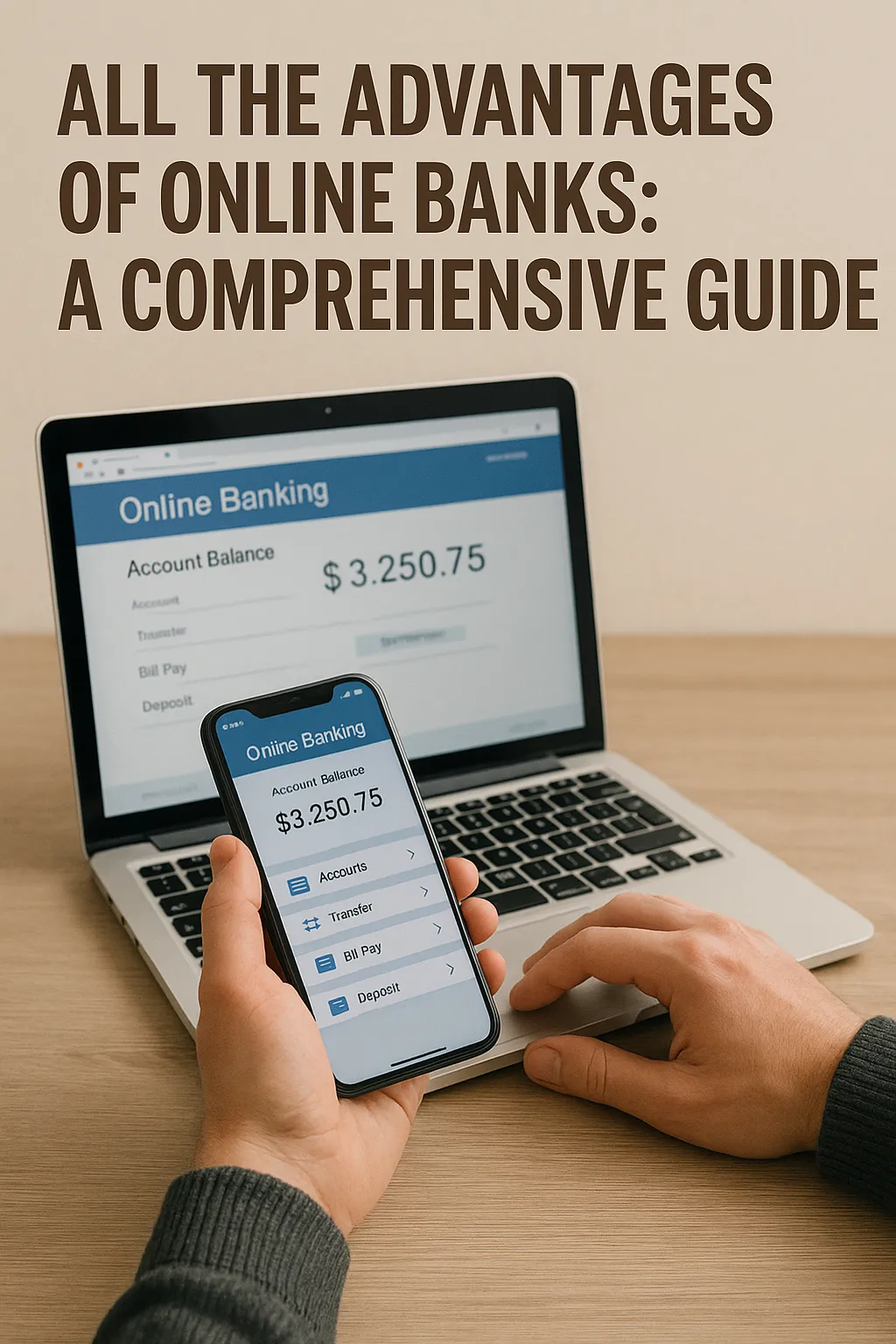All the Advantages of Online Banks: A Comprehensive Guide
Banking has changed dramatically over the past decade. With the rise of technology, online banks have become a powerful alternative to traditional brick-and-mortar institutions. They provide convenience, competitive interest rates, and a wide range of digital tools that make managing your money easier than ever before.
In this comprehensive guide to online banks, we will explore all the advantages of choosing an online banking platform, why more people are switching, and how you can make the most of this modern financial option.

1. What Are Online Banks?
Online banks (also called digital banks or direct banks) operate primarily on the internet without physical branches. These institutions provide all the essential financial services—checking, savings, loans, and more—through websites and mobile apps.
Instead of visiting a physical location, customers access their accounts from their computers or smartphones, which has reshaped how we think about everyday banking. By operating online, these banks significantly reduce overhead costs and pass the savings on to customers.
2. The Convenience of Digital Banking
One of the biggest advantages of online banks is convenience. With a few clicks or taps, you can transfer money, pay bills, check balances, or deposit checks without leaving your home.
Online banks typically offer 24/7 account access, meaning you can handle transactions at any time, even during weekends and holidays. For people with busy schedules, this level of accessibility is a game changer compared to limited branch hours.
3. Lower Fees and Better Interest Rates
Without the costs associated with maintaining physical branches, online banks can offer lower fees and higher yields.
- No monthly maintenance fees: Many online banks do not charge for account maintenance.
- High-yield savings accounts: Online savings accounts often provide interest rates significantly higher than those at traditional banks.
- Reduced transaction costs: Lower fees on services like wire transfers and international transactions.
These cost savings are a major reason why customers switch from traditional banks to digital banks.
4. Advanced Online Banking Features
Modern online banking platforms are equipped with tools that make managing money easier:
H3: Budgeting and Financial Tracking
Many online banks include dashboards that track spending habits and categorize expenses.
H3: Automated Savings
Features such as automatic transfers to savings accounts or round-up programs help build financial discipline.
H4: Instant Alerts
Mobile apps provide real-time notifications for deposits, withdrawals, or unusual activity, keeping you informed at all times.
5. Safety and Security of Online Banking
Security is a primary concern when it comes to money. Online banks invest heavily in advanced security measures:
- Encryption: Protects your data during transactions.
- Multi-factor authentication: Adds an extra layer of account security.
- Fraud monitoring systems: Detect and prevent suspicious activity.
When combined with strong passwords and careful online habits, online banking security can be as safe—or even safer—than visiting a physical branch.
6. Faster Processing and Transfers
Online banks streamline the process of moving and accessing funds. Many offer:
- Faster direct deposits: Some even provide early access to paychecks.
- Instant internal transfers: Move funds between accounts quickly.
- Quick loan applications: Apply for loans online and get approval in a fraction of the time compared to traditional banks.
These efficiencies eliminate much of the waiting time associated with conventional banking processes.
7. Accessibility for a Digital Lifestyle
In an increasingly mobile world, digital banks match the needs of people who live a fast-paced life:
- Manage accounts while traveling
- Use mobile check deposits through your phone camera
- Access your money globally without relying on branch locations
For international travelers or remote workers, these features make online banking the perfect choice.
8. Innovation Through Fintech Partnerships
Many online banks collaborate with fintech companies to provide innovative services that go beyond basic banking:
- Integrated investment platforms for stocks, ETFs, and retirement planning
- AI-driven financial advice tailored to your spending habits
- Cryptocurrency services in some cases
These innovations create a seamless experience that combines banking, saving, investing, and planning all in one platform.
9. Customer Service: Always Connected
Unlike traditional banks where you wait in line or hold on the phone for long periods, online banks emphasize quick and effective customer support:
- Live chat support: Get help directly through the app or website.
- 24/7 call centers: Available at any time, regardless of location.
- Comprehensive FAQs and tutorials: Empower users to solve issues on their own.
Although you do not see a teller face-to-face, digital banks often deliver customer support faster.
10. Are Online Banks Right for You?
While the benefits of online banks are clear, they may not be ideal for everyone. Consider these points:
- If you handle a lot of cash, the lack of physical branches may be a limitation.
- Some customers value in-person relationships with their bank.
- Reliable internet access is essential for managing accounts online.
If these factors are not obstacles, online banks can provide a simpler, more rewarding, and more efficient way to manage your finances.
Conclusion
Banking no longer requires waiting in line or being limited by branch hours. Online banks bring speed, convenience, cost savings, and innovation to your financial life.
As this comprehensive guide to online banking has shown, choosing a digital bank offers a wide range of benefits—from better interest rates to robust financial tools—making it easier to achieve your goals in today’s digital era.
For those ready to embrace technology and take control of their finances, online banks present a modern solution that redefines what banking can be.











